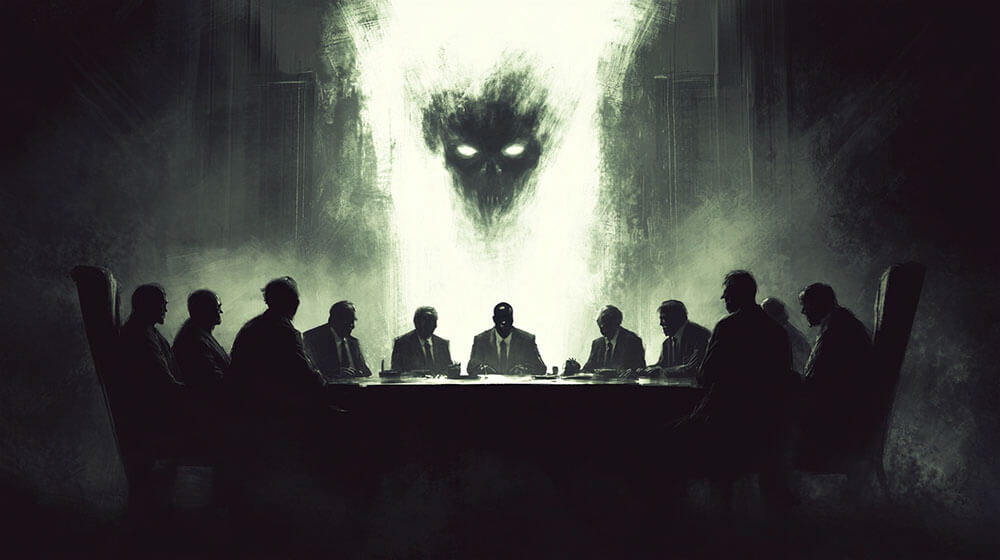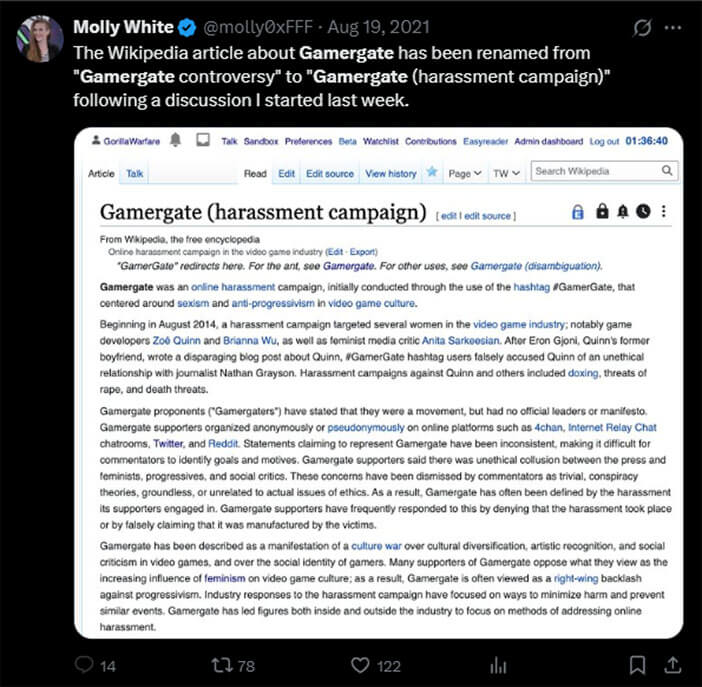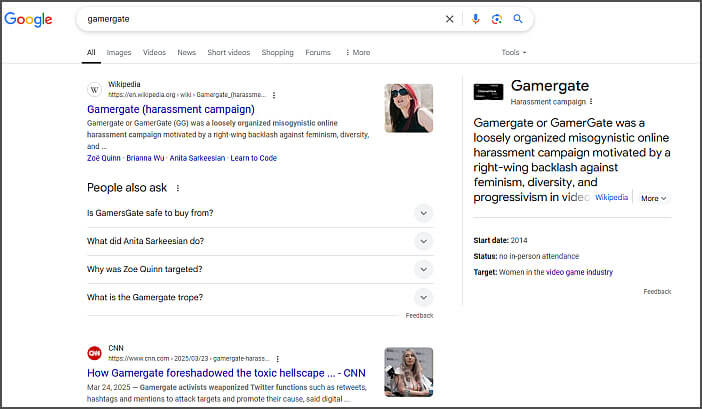As time distances us from the events of 2014, the memory of Gamergate has begun to fade. For those who lived through it, Gamergate was a chaotic, messy, and multifaceted online uprising—part consumer revolt, part cultural backlash, part pushback against a corrupt and insular games press. But for a new generation that wasn’t there, the story they’re being told is something very different: a coordinated harassment campaign against women in gaming. This isn’t just a misunderstanding. It’s a deliberate rewriting of history to serve ideological purposes.
Narrative Capture in Real Time
Initially, Gamergate was framed by many of its participants as a protest against the unethical behavior of journalists, the lack of transparency in games media, and the increasingly political slant of game coverage. The hashtag gave voice to long-simmering frustration among gamers who felt disrespected and misrepresented by the very people who claimed to represent them.
One of the central flashpoints was the exposure of collusion among video game journalists, including the infamous “GameJournoPros” email list. Rather than confront the corruption, much of the media deflected by pushing a coordinated narrative: that Gamergate was about harassing women. This “harassment angle” functioned as a red herring—a tool to avoid accountability, discredit critics, and shift public attention away from the unethical behavior that had been brought to light.

Ironically, the claim that Gamergate was purely an “online harassment campaign” is a conspiracy theory in itself—one perpetuated by activists and media figures to delegitimize an inconvenient movement. These individuals strung together anecdotal incidents, cherry-picked bad actors, and ignored the broader context to build a narrative that served their ideological aims. The irony is rich: those who routinely smear dissenters as “conspiracy theorists” fabricated and spread their own grand theory, complete with villains, victims, and moral panic.
Wikipedia’s Gamergate Article: Disproportionate Length
Compared to the 2014 version of the article which is 5,303 words, Wikipedia’s 2025 entry on the Gamergate controversy is remarkably long – roughly 11,220 words – which makes it longer than the encyclopedia’s articles on many objectively more monumental historical events. For perspective:
- The Great Fire of London (1666) – ~6,726 words. Destroyed 80% of London and led to major urban reform.
- The Boston Tea Party (1773) – ~4,475 words. A pivotal catalyst for the American Revolution.
- Assassination of Abraham Lincoln (1865) – ~5,919 words. A presidential murder that altered post-Civil War America.
- Jack the Ripper (1888) – ~6,839 words. The most notorious serial killer in human history.
- Harvey Weinstein (2022) – ~4,039 words. American film producer and convicted sex offender.
That Gamergate—an online dispute about video games and journalism—commands more editorial space than the Boston Tea Party or Lincoln’s assassination is absurd on its face. This isn’t due to its actual historical weight, but rather the result of obsessive over-documentation, ideological entrenchment, and edit wars. The article reads like a polemic rather than a reference, bloated with every think piece, activist quote, and partisan interpretation that could be shoehorned in.
If word count is any indicator, Wikipedia doesn’t just overstate Gamergate’s importance—it practically deifies it. This suggests the article’s size is driven not by relevance but by editorial obsession and a desire to canonize a specific narrative.
Wikipedia’s Gamergate Article: Narrative Laundering and Bias
Anyone who revisits the Wikipedia article on Gamergate today is met with a long, one-sided screed masquerading as an encyclopedic entry. The bloated article is a carefully orchestrated diatribe—a symphony of left-wing voices and progressive commentators, many of whom had little or nothing to do with the original controversy. It is less a historical document and more a curated editorial, dripping with ideological bias and framed to support a predetermined conclusion.

What stands out most is how the entry devotes the vast majority of its content to the harassment narrative, while almost entirely ignoring the substantive issues that sparked Gamergate in the first place—namely, journalistic ethics, ideological overreach in gaming media, and the coordinated silencing of dissent. In place of a balanced exploration, the article offers a steady drumbeat of opinion, anecdote, and selective sourcing, designed to present only one version of events.
One-Sided Sources and Absurd Claims
One especially egregious example comes from a quote by Chrisella Herzog, which is included without critique. She claims that Gamergate contained “virulent strains and violent sentiments of homophobia, transphobia, anti-Semitism, racism, and neo-Nazism.” This is a sweeping and defamatory accusation presented with no evidence or sourcing—yet Wikipedia presents it with the same weight as a verified historical fact. That is not documentation; it’s narrative poisoning.
The article even cites the Southern Poverty Law Center (SPLC), a leftist pressure group with its own history of ideological activism and controversial designations, as if it were a neutral authority. This tactic—laundering partisan claims through supposedly credible institutions—is a hallmark of disinformation wrapped in a veneer of legitimacy.
In perhaps the most absurd moment, Wikipedia quotes Brianna Wu as suggesting that Gamergate was a precursor to the January 6 Capitol riot. This claim is not supported by any serious evidence or investigation, but it fits neatly into the mythos that Gamergate was the origin of all online hate and extremism. Such revisionism defies logic, but it thrives in echo chambers where ideological narratives go unchallenged.
The Mythologizing of Gamergate
The article functions less as a reference and more as a myth-making document. It treats Gamergate as a kind of digital Mein Kampf—a foundational text of American extremism and a root cause for everything from internet toxicity to the January 6 Capitol riot. By doing so, it elevates the controversy to a near-mythical status, transforming a disorganized online revolt into the genesis of modern hate.
This isn’t historical documentation—it’s propaganda of the highest order. Wikipedia isn’t merely curating knowledge—it’s manufacturing consent.
The levers of power seem to attract those that would abuse it. As Edward Bernays, the father of modern propaganda, warned:
“The conscious and intelligent manipulation of the organized habits and opinions of the masses is an important element in democratic society. Those who manipulate this unseen mechanism of society constitute an invisible government which is the true ruling power of our country.”
Many of the so-called “sources” in the article are simply opportunists—journalists, academics, and activists eager to attach themselves to the Gamergate buzzword to gain relevance or signal alignment with fashionable narratives.

Perhaps the most telling example is the inclusion of Canadian Prime Minister Justin Trudeau, who had no direct involvement in or firsthand knowledge of the events. Yet his condemnation is cited as if to lend the harassment narrative an air of official legitimacy and moral gravity, as though the mere mention of a head of state confers accuracy. It’s a transparent attempt to wrap a one-sided storyline in the imprimatur of respectability.
This is a textbook case of narrative consolidation—where repetition across media, Wikipedia, and political figures creates the illusion of universal consensus. These aren’t sources; they’re ideological endorsements echoing within a curated chamber.
Molly White: ArbCom Aristocrat and Ideological Actor
One of the key figures behind this narrative shift at Wikipedia was Molly White, an openly queer Wikipedia administrator and ArbCom veteran. But White isn’t just a bystander—she’s a narrative architect. In 2015, while serving as an ArbCom judge, she helped draft the Gamergate ruling that banned editors and effectively cemented the “harassment” framing. Despite having a clear ideological alignment, including a public focus on ‘right-wing extremism’, she never recused herself from the case.

White has edited a wide range of articles on right-wing movements and platforms such as the Boogaloo movement, Gab, and Parler, yet shows little interest in addressing comparable forms of extremism from the political left, including the recent trend of violence committed by transgender individuals. Her editorial focus reveals a consistent ideological slant.
Perhaps the most revealing example is her work on the Wikipedia article about incels. The page is laced with sweeping hostility, presenting the community with zero nuance and framing all incels as irredeemably misogynistic. The language and framing are dripping with contempt, revealing an activist’s hand rather than an impartial editor’s. Her body of work is not that of a neutral observer but a partisan voice embedded in Wikipedia’s most powerful inner circle.
Molly White and the Wikipedia Title Change
Fast-forward to August 2021, and White openly took credit for initiating the move to rename the article to “Gamergate (harassment campaign).” In a post on X (formerly Twitter), she bragged: “Following a discussion I started last week, the Gamergate article has now been retitled to Gamergate (harassment campaign).” Her Talk page proposal leaned heavily on selective sources like The Guardian, ignored Gamergate’s original ethics critiques, and relied on her ArbCom reputation to steer the editorial consensus. The decision ultimately passed with a narrow 2:1 margin.

White even cited her own experience of online harassment in 2016 as justification for the framing shift—hardly the stance of a neutral editor. Her broader editing history further reveals her ideological motives: she has vilified incels as inherently “misogynist,” while avoiding mention of trends like trans violence or left-wing extremism. This isn’t balanced encyclopedic work—it’s activist editing.
X users have called out White for her bias. One notable reply from @Thomas_Jetson criticized her directly: “Your biases… are harmful.” But White doubled down, reinforcing her framing while locking in a version of history that many believe is false.
Molly White’s Legacy: Framing the Public’s First Impression
Now, if a casual reader—especially a low-information or time-strapped individual—Googles “Gamergate,” the first thing they see is “harassment campaign” in the Wikipedia title. The manipulation is subtle but powerful: it implants a conclusion before the user has even read a single sentence. It turns a contested moment in online history into a settled fact.

Adding to the problem is how Molly White’s own Wikipedia biography has been whitewashed. The article omits any mention of the criticism she’s faced, including allegations of ideological bias during her tenure editing controversial pages like Gamergate. Instead, the article frames her as a principled defender of truth and victim of online harassment, reinforcing her public image as a martyr figure. This kind of narrative protection—where favored individuals are shielded from scrutiny while dissenters are smeared—reveals just how deeply compromised Wikipedia’s neutrality has become. It’s not just about what’s included in the public record, but what’s carefully omitted.
Brianna Wu: Opportunism and Self-Promotion
Another figure who leveraged Gamergate for personal gain is Brianna Wu, a transgender woman who inserted herself into the controversy and quickly became one of its most high-profile “victims.” Wu used this visibility as a springboard for a failed run for Congress and to launch a media persona as an activist and political commentator.
Although often described as a “game developer,” Wu has no notable released games to her name that achieved any meaningful popularity or critical acclaim. Her notoriety stems entirely from the Gamergate controversy, which she capitalized on for publicity, attention, and political clout. Like others who exploited the moral panic, Wu’s role in the controversy was amplified by a media machine hungry for symbols and talking points that fit a predetermined narrative.
Anita Sarkeesian: The Damsel in Her Own Narrative
Anita Sarkeesian, like Wu, had nothing to do with the origins of Gamergate. She injected herself into the controversy after the fact, using it to gain even more notoriety for her “Tropes vs Women in Video Games” video series. These videos were highly critical of male gamers and traditional game narratives, and many gamers saw them as ideologically driven hit pieces.

Ironically, one of Sarkeesian’s main critiques was the overuse of the “Damsel in Distress” trope—yet she and her fellow activists proceeded to leverage that very trope for themselves, positioning as helpless female victims under attack from moustache twirling male gamers. It was hypocrisy at its finest, using the narrative of victimhood as both sword and shield to deflect criticism and gain power.
The Rolling Stone Hoax and the “Rape Culture” Narrative
The media’s attempt to frame Gamergate as a symptom of a larger “toxic masculinity” crisis mirrors another infamous journalistic failure: Rolling Stone’s now-retracted article “A Rape on Campus.” Published on November 19, 2014, the piece claimed a horrific gang rape had occurred at the Phi Kappa Psi fraternity house at the University of Virginia.
The story, written by Sabrina Rubin Erdely, aggressively pushed the “rape culture” narrative and became a rallying point for campus activism. But by early 2015, the entire story unraveled. A Columbia Journalism School investigation exposed the article’s deep flaws, and Rolling Stone retracted it. The magazine later paid millions in legal settlements, including $1.65 million to Phi Kappa Psi.

This wasn’t just bad reporting—it was narrative-driven journalism designed to validate an ideology, not reveal truth. The villains were rich white frat boys; the victim, a traumatized young woman; and the system, callous and indifferent. It echoed the same moral framework used to attack gamers during Gamergate. Yet despite the massive fallout and damage to real people, Wikipedia’s article on “rape culture” makes no mention of the Rolling Stone hoax or the Duke Lacrosse hoax. Once again, inconvenient facts are erased in service of an overarching narrative.
The “frat boy” caricature used by Rolling Stone—privileged, white, predatory men operating with impunity—didn’t disappear after the hoax was exposed. It reemerged years later during the EEOC lawsuit against video game studio Activision-Blizzard, where the term “frat boy culture” was deployed to cast the company in a similar light. Much like the UVA case, this label was accepted uncritically by much of the media, despite limited evidence. The reuse of this trope reflects a broader ideological pattern: weaponizing vague but emotionally loaded narratives to shame, punish, or remake institutions.
Hagiography of Victimhood
The real function of this revisionism is to serve the broader ideological and political goals of the post-2016 progressive movement. In the wake of Donald Trump’s election, Gamergate was retrofitted into a symbolic weapon in the culture war—used to stoke fears about a supposed surge in misogyny and rally women as a political bloc. Alongside the rise of #MeToo and “Believe All Women,” this reframing helped fuel a strategic narrative designed to mobilize female voters for the 2018 midterms and the 2020 presidential election. Casting Gamergate as the original sin of internet misogyny gave progressives a cultural villain that dovetailed perfectly with electoral strategy and activist momentum.
By presenting themselves as the righteous victims of an unprovoked digital assault, feminist activists and their allies have constructed a martyrdom mythology. Criticism is rebranded as harassment. Disagreement is pathologized. Entire communities are dismissed as toxic.
This Wikipedia-approved version of history now serves to justify the ongoing censorship of speech, the expansion of “Trust and Safety” teams, and the moral panic around online male spaces.
The truth is far more complicated. Gamergate included men and women, liberals and conservatives, apolitical gamers and libertarians, journalists, and consumers. It was messy, flawed, and at times ugly. But it was also one of the first signs that average people were no longer willing to silently accept elite narratives. It was not a campaign of harassment—it was a revolt against corruption, dishonesty, and ideological overreach.. In the wake of #MeToo and “Believe All Women,” Gamergate has been recast as the original sin of internet misogyny.
The Psychology and Ideology Behind Anti-Gamergate
From my point of view—as both a gamer and a writer—all I ever wanted was to celebrate the joy of playing and designing video games. But when Gamergate erupted, I made the difficult decision to pause what I was doing and defend gamers. Why? Because what I saw was not a mob of misogynists—I saw everyday people trying to protect something they loved. Most gamers aren’t political. They’re not activists. They’re people who just want to immerse themselves in stories, game mechanics, worlds, and escapist fun. That’s why this entire demonization campaign against them has been so profoundly heartbreaking.

Gamers never asked for this fight. They were thrust into it.
Yes, some individuals went too far in their anger and their rhetoric. But the motivations of most were not rooted in hate—they were rooted in frustration and loyalty. Gamers had spent years being mocked by the mainstream press and misrepresented by people who didn’t play or understand games. And when their culture was suddenly invaded by ideological activists who sought to reshape it from the top down, many felt they had no choice but to resist.
The anti-Gamergate movement, in contrast, was powered by a toxic intersectional cocktail of radical feminism, status-seeking, moral panic, and tribal groupthink. It saw male-dominated gaming spaces as suspect by default and framed the entire subculture as in need of reform. It was animated not by love of games, but by ideological conquest—an effort to seize control of a creative space and make it bend to external values.
This was never about protecting women. It was about controlling speech, reshaping identity, and colonizing a medium that had not yet been ideologically tamed. The activists who rose to prominence during Gamergate used it to build brands, forge careers, and launch political ambitions, all while presenting themselves as victims of a toxic culture they never participated in.
Most gamers weren’t ready for this. They didn’t see it coming. And when it hit, their response wasn’t rooted in bigotry—it was rooted in duty. Duty to defend their hobby. Duty to defend their reputations. Duty to preserve something fun, human, and apolitical from becoming another front in an ideological war.
From Wikipedia to Britannica: The Lock-In of a Narrative
What began as a fringe moral panic about “harassment in gaming” has now become the dominant historical account, not just in Wikipedia, but across virtually all mainstream information channels. A striking example is the Encyclopedia Britannica, which now echoes Wikipedia’s framing of Gamergate as a “harassment campaign.” This isn’t a minor editorial decision—it’s a signal that the narrative has fully metastasized into institutional memory.

When both Wikipedia and Britannica—the two most cited reference platforms in the English-speaking world—frame an event in identical ideological terms, it becomes nearly impossible for the average person to question it. This is how historical nuance dies: not with a bang, but with a citation.
The lock-in of narrative isn’t accidental. It’s the result of years of repetition, strategic framing, and the suppression of dissenting perspectives. Wikipedia laid the groundwork. Now outlets like Britannica and CNN repeat the script without scrutiny. The public doesn’t see competing interpretations. They see a wall of unity that suggests the matter is settled.
In truth, it never was.
From Idealism to Ideological Capture: The Wikipedia Decline
Wikipedia began as a bold experiment—a decentralized, open platform where anyone could contribute to a living, breathing encyclopedia of human knowledge. The vision was noble: knowledge by the people, for the people. But time has not been kind to that vision. What once seemed like a beacon of digital democracy has become something else entirely: a gatekept hierarchy where a small group of ideologically motivated editors control the narrative under the guise of neutrality.
He who controls knowledge controls the narrative—and he who controls the narrative controls perception, legitimacy, and power itself.
This truth is nowhere more apparent than in Wikipedia’s current structure. Far from being an open commons, most of the site’s high-impact or politically sensitive articles are locked behind multiple layers of editorial protection. “Full protection,” “semi-protection,” and “extended confirmed” statuses prevent ordinary users from making changes. The excuse is vandalism prevention. The reality is control.
Over the years, the platform’s built-in policies have become labyrinthine—ostensibly to ensure quality, but in practice they serve to entrench power in the hands of veteran editors and administrators. New contributors are routinely driven away, reverted, or banned for failing to navigate an opaque bureaucracy designed to favor insiders. Worse, many of those insiders share the same ideological worldview—and enforce it through selective sourcing, subtle editorial framing, and strategic reversions.
Wikipedia as an Engine of Perception Control
Even Wikipedia’s co-founder, Larry Sanger, has walked away from the platform, sounding the alarm on what it has become. In a 2021 interview, he said:
“Wikipedia is not an objective reference source anymore… it’s a propaganda vehicle for a certain set of ideologies.”

His loss of faith should be a red flag for anyone who still views Wikipedia as a neutral or trustworthy source.
Wikipedia’s decline is a classic case of the law of unintended consequences. Systems built with open ideals are always vulnerable to capture. Over time, bad actors learn to exploit rules, silence opposition, and dominate critical narratives. What starts as transparency becomes a smokescreen. What begins as collaboration becomes control.
Today, Wikipedia’s top search ranking on Google and other search engines gives it disproportionate influence over public understanding. But behind the #1 result is not an unbiased consensus—it’s the output of a small, often coordinated group of editors deciding what counts as “truth.”
The result is a hollow shell of what Wikipedia once aspired to be: not a democratic marketplace of ideas, but a curated display window—its shelves stocked only with what the gatekeepers deem acceptable.
Conclusion
One of the most revealing statistics about Wikipedia is that 77% of its articles are written by just 1% of its editors. This fact alone exposes the myth that Wikipedia is a “democratized” source of knowledge. In reality, it’s a highly centralized system where a small group of elite editors, many of them ideologically aligned, exert disproportionate control over what the public sees, believes, and remembers. That’s not crowdsourcing—that’s oligarchy masquerading as consensus.
If we allow this revisionist history to go unchallenged, we legitimize a dangerous trend: rewriting the past to serve present-day ideological goals. The stakes are high, because Gamergate is being used as a blueprint for how to discredit and suppress dissent in the digital age.
We owe it to the truth—and to the future—to resist this contrived hagiography of victimhood. The history of Gamergate must be told in full, not edited down to a convenient morality tale. Because if they can rewrite the past, they can control the future.
—Wolfshead







Gamergate was and is almost unknown outside the USA and Britain. Even I who is looking a lot over the pond only got notice of it late. It was never much of a thing in Europe!
And it will stay unknown and become what Wikipedia says, the horrible “Gamergate (harassment campaign)” and people who owe their fame to being horrible and playing victim like Quinn, Wu and Sarkeesian will be remembered as victims.
This is a horrible misinterpretation that will become the remembered truth! The more words are used, the bigger the lie and coverup.
Maybe you could add a short “how Gamergate developed and what it was” article and link to this one. Just to preserve a more accurate memory of the movement.
This is a good idea! I’ll create a post that gives readers the best existing articles and videos explaining what happened.